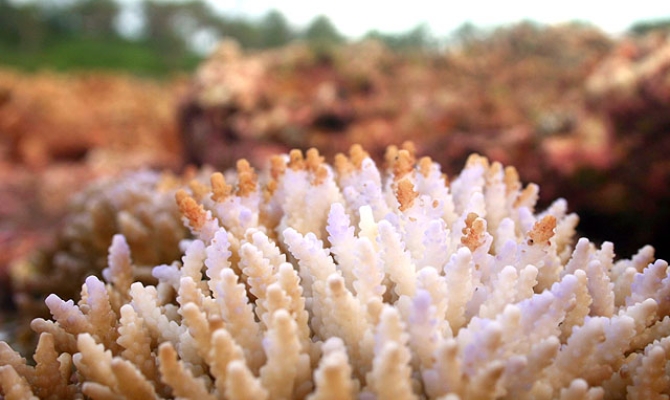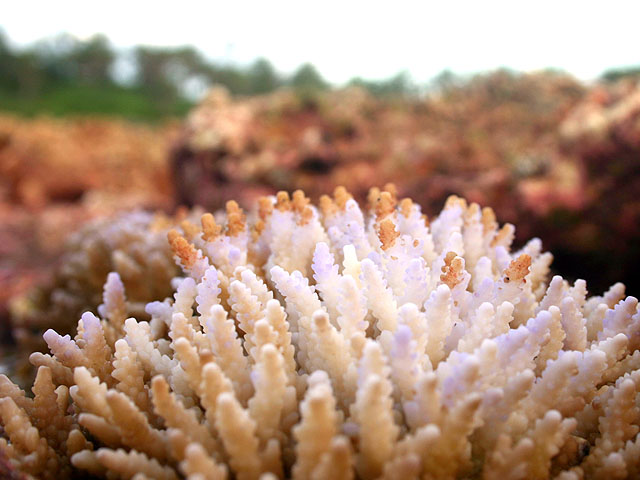
Climate Change Resilience
In December, 2014 wide spread coral bleaching was reported for the Marshall Islands, Guam, Northern Mariana Islands, the North West Hawaiian Islands, and Kiribati, potentially causing wide-spread coral mortalities in these regions.
Coral bleaching occurs when stressed corals expel their zooxanthellae (symbiotic algae that give corals their distinctive colors), resulting in the white coral skeleton being exposed. While bleached, corals are susceptible to damage and prolonged bleaching can result in the death of the coral. For example, in 2005 coral bleaching was responsible for loss of half of the corals in the US's Caribbean waters.
The most common cause of coral bleaching is elevated temperatures over a long period of time (weeks), and additional causes are runoff and pollution, over-exposure to sunlight, and extreme low tides (for more information see
http://oceanservice.noaa.gov/facts/coral_bleach.html).

Bleached coral (Photo: Edna Allan)
NOAA's Coral Reef Watch produces coral bleaching warnings by looking at sea surface temperatures and calculating "degree heating weeks" – comparing the current sea surface temperature trends with historical averages. Currently there are alerts for the central Pacific and watches for most of the equatorial and eastern Pacific. The sea surface temperature conditions which are causing the reported coral bleaching are being driven by the current El Nino conditions. We are experiencing a weak El Nino, which has caused the warm pool, normally found in the western equatorial Pacific, to shift east, elevating sea surface temperatures there. Compounding this is the impacts of climate change, which is increasing sea surface temperatures globally.
While challenging in nature, we can take action about coral bleaching. Monitoring and reporting of coral bleaching is as it allows for the identification of vulnerable and resilient/resistant reefs. When corals are bleached they should be protected, for example by restricting fishing and recreational access. Globally, coral bleaching will likely become more severe due to climate change, so it is important that we support limiting CO2 emissions and limit global temperature increases through fora such as the UNFCCC negotiations.
Useful links:
Report bleaching -
http://www.reefbase.org/contribute/bleachingreport.aspx
NOAA Coral Reef Watch -
http://coralreefwatch.noaa.gov/satellite/index.php
Coral Reef Watch Tutorial -
http://coralreefwatch.noaa.gov/satellite/education/tutorial/welcome.php
NOAA Coral Bleaching Fact Sheet -
http://oceanservice.noaa.gov/facts/coral_bleach.html
ABC News -
http://www.abc.net.au/news/2014-12-22/global-warming-blamed-for-pacific-coral-bleaching/5983718
Climate change reports from PACCSAP -
http://www.pacificclimatechangescience.org/
Coral bleaching occurs when stressed corals expel their zooxanthellae (symbiotic algae that give corals their distinctive colors), resulting in the white coral skeleton being exposed. While bleached, corals are susceptible to damage and prolonged bleaching can result in the death of the coral. For example, in 2005 coral bleaching was responsible for loss of half of the corals in the US's Caribbean waters.
The most common cause of coral bleaching is elevated temperatures over a long period of time (weeks), and additional causes are runoff and pollution, over-exposure to sunlight, and extreme low tides (for more information see
http://oceanservice.noaa.gov/facts/coral_bleach.html).

Bleached coral (Photo: Edna Allan)
NOAA's Coral Reef Watch produces coral bleaching warnings by looking at sea surface temperatures and calculating "degree heating weeks" – comparing the current sea surface temperature trends with historical averages. Currently there are alerts for the central Pacific and watches for most of the equatorial and eastern Pacific. The sea surface temperature conditions which are causing the reported coral bleaching are being driven by the current El Nino conditions. We are experiencing a weak El Nino, which has caused the warm pool, normally found in the western equatorial Pacific, to shift east, elevating sea surface temperatures there. Compounding this is the impacts of climate change, which is increasing sea surface temperatures globally.
While challenging in nature, we can take action about coral bleaching. Monitoring and reporting of coral bleaching is as it allows for the identification of vulnerable and resilient/resistant reefs. When corals are bleached they should be protected, for example by restricting fishing and recreational access. Globally, coral bleaching will likely become more severe due to climate change, so it is important that we support limiting CO2 emissions and limit global temperature increases through fora such as the UNFCCC negotiations.
Useful links:
Report bleaching -
http://www.reefbase.org/contribute/bleachingreport.aspx
NOAA Coral Reef Watch -
http://coralreefwatch.noaa.gov/satellite/index.php
Coral Reef Watch Tutorial -
http://coralreefwatch.noaa.gov/satellite/education/tutorial/welcome.php
NOAA Coral Bleaching Fact Sheet -
http://oceanservice.noaa.gov/facts/coral_bleach.html
ABC News -
http://www.abc.net.au/news/2014-12-22/global-warming-blamed-for-pacific-coral-bleaching/5983718
Climate change reports from PACCSAP -
http://www.pacificclimatechangescience.org/